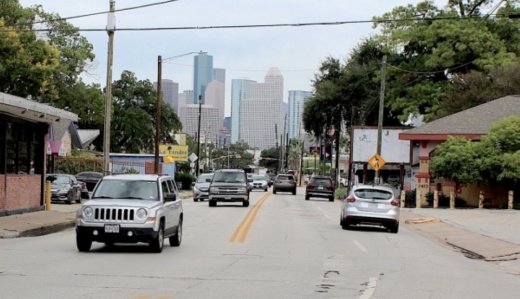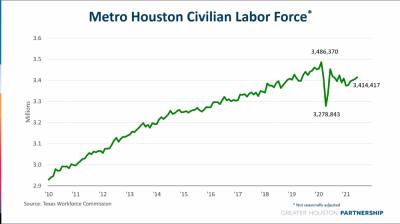Unemployment above state and national levels, certain sectors continuing to shed jobs and strong home sales following the COVID-19 pandemic are among the economic themes of Houston halfway through 2021.
The Greater Houston Partnership, which is the largest chamber of commerce in the Greater Houston area, delivered the findings July 21 in the latest webinar in its Economy Series. Patrick Jankowski, the Partnership’s vice president of research, presented the data.
Unemployment and job growth
The city is also in the bottom five of major American cities when it comes to recovering job losses caused by the pandemic, with 59.1% of jobs recovered according to the federal Bureau of Labor. Dallas, meanwhile, ranked the second highest with 87.5%.
In the first six months of 2021, Greater Houston Partnership data showed Houston added almost 50,000 jobs, and Jankowski said barring unexpected developments with COVID-19, the city could expect around 80,000 to 100,000 jobs added by the end of the year thanks to projected hiring in the fall.
“In the second half of the year, Houston typically adds 30,000 to 50,000 jobs,” Jankowski said.
Jankowski stressed the importance of maintaining COVID-19 protocols as a way of helping the city’s workforce get back on its feet.
“We need to wear a mask, we need to get vaccinated, we need to do everything we can to get our job numbers up,” Jankowski said.
Houston’s unemployment rate through June sat at 7.4% per Texas Workforce Commission statistics, above the national and state averages of 6.1% and 6.6% respectively.
The presentation also showed, citing the Texas Workforce Commission, that while unemployment claims in 2021 were generally down, July had over 10,000 initial claims for the first time since early May.
Sectors facing structural change
Part of the problem facing job recovery in the city includes several economic factors undergoing what Jankowski called “structural change.”
Manufacturing, government, energy and construction industries continued to lose jobs after reopening, with construction needing to recover 33,400 jobs to reach pre-pandemic levels, according to Partnership data.
The same data showed the restaurant and entertainment industries needed to recover less than 5% of job losses to reach pre-pandemic levels, while transportation and finance sectors had already recovered to those levels.
Jankowski said although hotels still needed to make up over 5,000 losses, the return of conventions in the fall could help that sector recover.
COVID-19 adjustments lead to strong home sales
Jankowski cited work and demographic changes as possible reasons for Houston’s strong home sales numbers, which are projected to hit 130,000 by January 2022, according to the Houston Association of Realtors.
“There’s a significant number of working millennials, who have switched to a hybrid work environment during the pandemic who decided that maybe they don’t need an apartment downtown anymore,” Jankowski said.
2021 also saw high numbers of new homes beginning construction in the Houston area, with over 12,000 in the second quarter alone.
Jankowski signaled caution, however, pointing out the amount of vacant lots were also dropping with the increase in construction, potentially leading to an increase in prices for housing.
“I’ve talked to land developers, and they’re saying it’s the best market they’ve ever seen,” Jankowski said.






